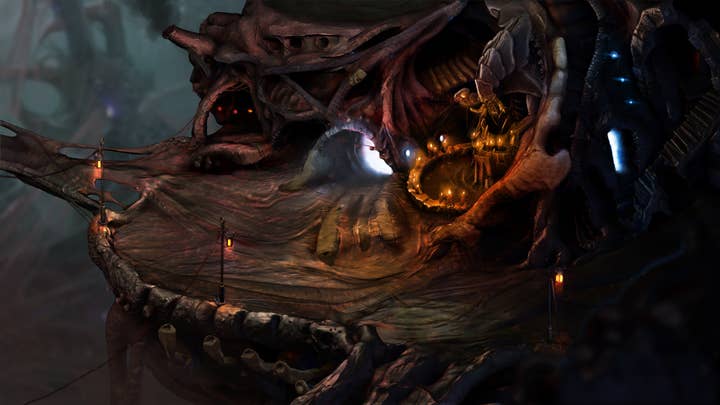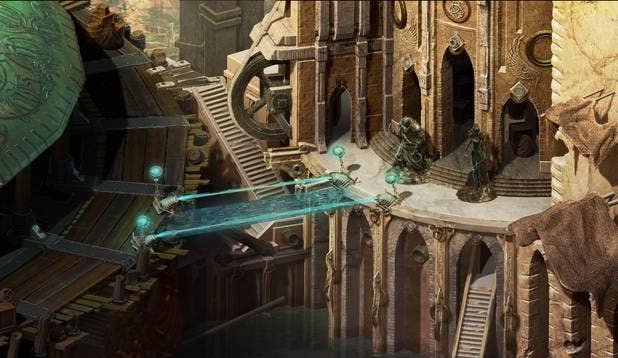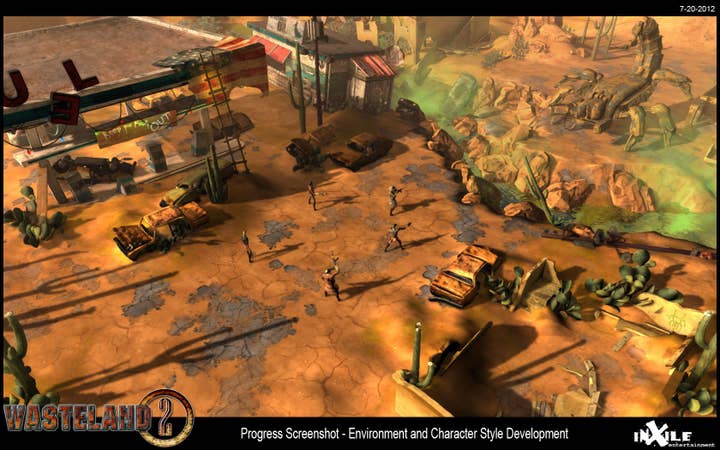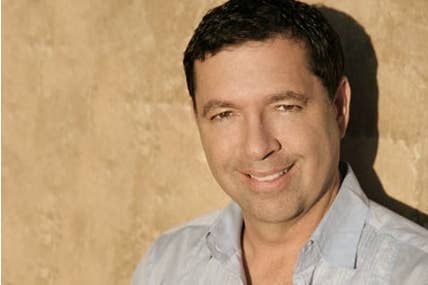Brian Fargo: We no longer have to answer to the Walmart buyer
The head of InXile talks about the big advantages of crowdfunding, eliminating gatekeepers, cooperating with Obsidian and more
Brian Fargo, CEO of InXile Entertainment, garnered a great deal of attention as well as substantial support when he successfully Kickstarted the development of the Wasteland II RPG. While that game is well under way, InXile has once again completed a successful Kickstarter for an RPG, this time based around the successful Planescape: Torment RPG from decades ago at Interplay. The new game, Torment: Tides of Numenera, is based around the new RPG setting created by noted D&D developer Monte Cook. GamesIndustry International caught up with Fargo at GDC to get his thoughts on where Kickstarter is headed, what it's like with two projects in development, and the progress Wasteland II is making.
The reason Fargo went ahead with the Torment Kickstarter while work on Wasteland II had already begun was simple: Keep the teams employed as projects move through different phases. With Wasteland II, "We're pretty much done on the design side," Fargo said. So it's time to get the design team started on a new project while programmers and artists work on bringing Wasteland II to life. This means a steady stream of work for all the different talents employed at InXile. "This is just a much healthier process for making quality games," Fargo noted.
Some may have wondered if these two RPGs might be too similar to each other, because they are both coming from the same publisher. There's no danger of that, Fargo believes. "Both projects are so radically different in their approach," he said. "When we did Planescape at Interplay, fans didn't jump up and down because it wasn't that big a thing. They liked it because it was so different. This is going to be so unlike anything else."

The experience with Wasteland II has helped InXile in many ways with the Torment project. Knowing how Kickstarter works was a big advantage. "Every title follows the same distribution," Fargo said. "The first five days and the last five days are the big ones, and in the middle it's fairly flat." Torment's successful funding at over $4 million shows that InXile has certainly learned how to create a winning Kickstarter campaign.
When it comes to production, the lessons of Wasteland II have also been a help. "We didn't know Unity at all when we started," Fargo explained. "Now, we have a whole plan for doing things. We have a tremendous start on Torment that we didn't have on Wasteland." Fargo noted the Unity store in particular, and the great contributions many fans have made to helping find and refine 3D items for use in the game.
"This is just a much healthier process for making quality games"
Brian Fargo
There is a lot of overlap between the supporters of Wasteland II and Torment, as you might expect. "When we offered Wasteland II on one of the upper tiers for Torment, most people said 'No thanks, I already got it,'" Fargo said. Still, there are plenty of people who have only backed one game or the other.
There have been some discoveries along the way for Fargo. "The great thing is our relationship with Obsidian has really grown," he said. "We're constantly helping each other without regard for the quid pro quo. We've found that with technology sharing and business sharing, over time something good will come out of it."
This sort of cooperation between game companies may be unusual, but Fargo believes it's beneficial - so he encourages it. When Fargo hears about a new RPG being Kickstarted that he thinks fans might like, he tweets it out. "There's this general feeling among most of the developers that are doing this now that 1 + 1 = 3, helping each other will tend to work out somehow," Fargo said. "And you can't imagine that happening on the publishing side."

Fargo has in fact spoken to some publishers to see if the success of these Kickstarters might have changed some attitudes. "I reached out to some publishers and said 'Hey, you should support us and I could talk about how you guys support indies,'" Fargo said. But the response has been lukewarm at best. As Fargo recalls it, most conversations have been along the lines of "We should find a way to do business, how about if we do the marketing for you?"
But Fargo is philosophical. "It's not like the publishers are worried too much by this; our numbers are not too interesting to them," Fargo noted. "I read the other day that Tomb Raider sold [over three] million copies and they're disappointed. If we sold 2 million copies, that means I build new roleplaying games for the next two decades, guaranteed. That's what that would mean to us."
The intense focus of publishers on AAA titles amuses Fargo when he considers the origins of the biggest sellers. "All of those franchises started off small," Fargo said. "I think the only franchise that I've seen that was truly built to be a billion-dollar franchise was Skylanders. Outside of that, Tomb Raider, GTA, Madden Football, they didn't start that way."
"I don't want to be in a situation where we finish Wasteland II and I have to hurry up and get Wasteland III out the door"
Brian Fargo
The change for InXile is interesting as it becomes a publisher in the new digital distribution age. "You barely need marketing because word of mouth is everything these days," Fargo pointed out. "And your sales force is your backers."
Fargo is happy about what this change means to the content of the games. "We used to have to make changes to our content because of what the buyer at Walmart said," Fargo recalled. "Gatekeepers are out now. The gatekeeper and the audience are one and the same. Now that I have a symbiotic relationship through crowdfunding, my goals are exactly in sync with the customer giving me the money. We are on the same page; all we both want is a great game. When you get money from other people, you think that's obvious but it's not. They might have other agendas, which could be their shareholders, or making the quarter, maybe I'm competing with another product of theirs, they want to change it because of that. They often will have different perspectives on the audience."
The way publishers handle risk for AAA games is to minimize innovation and stick to sequels. Given what InXile is able to build with a few million dollars, couldn't a big publisher take $40 million and make 10 bets with that money instead of one title, and have a greater chance of a hit? "Isn't that what King.com does, but at a different scale?" asks Fargo. "They made a hundred ten thousand dollar bets, or whatever their number is."
The Kickstarter method is preferable, according to Fargo. "Our game certainly has less risk because it's being pre-ordered," Fargo notes. "I specifically make the game for that audience, and then I let the chips fall where they may. I think people that like roleplaying games are going to love it. Some people say, 'How do you make it for the younger generation,' and I don't think about that. I'm just going to make something that's smart and intelligent, nuanced, and the audience will figure it out."

The ideal situation for Fargo, assuming Wasteland II and Torment do well, is to continue to do RPGs that are interesting. "I don't want to be in a situation where we finish Wasteland II and I have to hurry up and get Wasteland III out the door. I don't ever want to be in that situation," Fargo said. "You do a sequel when you have the right idea." In other words, do a sequel because you want to, not because you have to.
Fargo has great respect for companies that create the games they want to, in the way they want to. "Demon Souls is a good example," Fargo points out. "They just know who their audience is and they go for it; it's not for everybody. They do it without shame, and people love them for it." It's also important to give games enough time. "That's why Valve is such a great company. They don't rush to get out another version of what they did. That's why they're always fresh, and they're so revered. There is a direct correlation with a developer that has time to do it right that consistently performs. Valve, Ken Levine, Rockstar... they spend the time to get it right every time without having to force it out the door."
Wasteland II is making progress towards the goal of shipping later this year. "What we're doing now is by the end of April, we'll have all the levels in for Wasteland, and everything will be blocked out," Fargo said. "We can actually start playing the game and tuning it. Once we have that, our artists will start refining the graphics. We should ship before the end of the year. There's no technology risk, so my worst case is I get towards the end and we say we need a month of QA time, and if that was the case, nobody would really care. Our backers say 'Just get it right.'"

